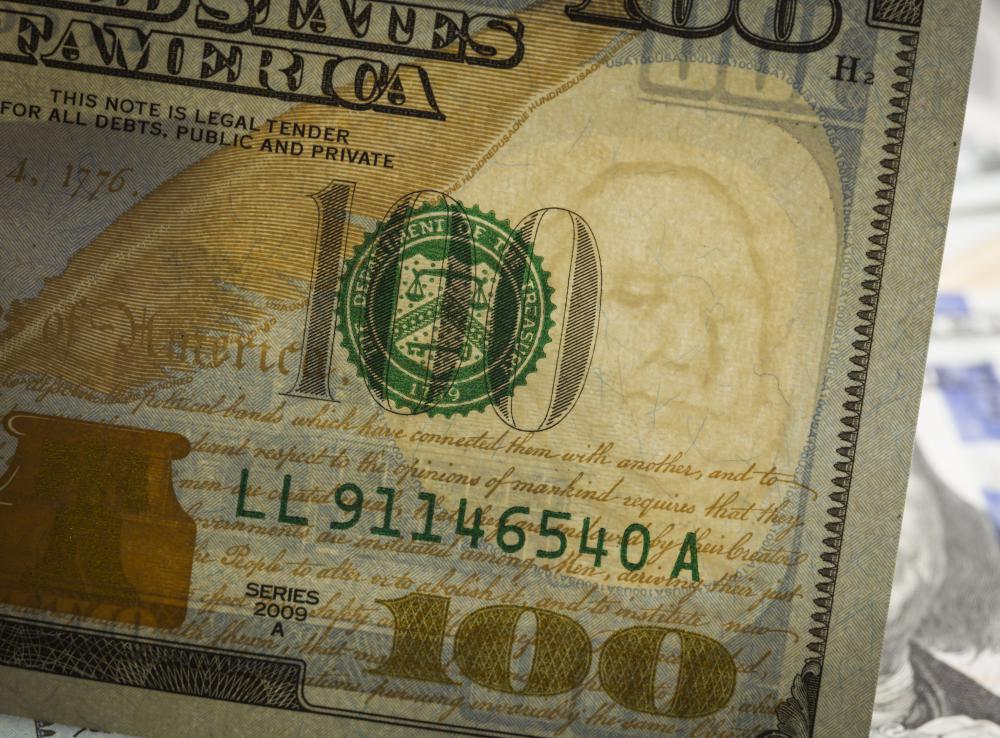At WiseGEEK, we're committed to delivering accurate, trustworthy information. Our expert-authored content is rigorously fact-checked and sourced from credible authorities. Discover how we uphold the highest standards in providing you with reliable knowledge.
What Are Money Counters?
Banks and businesses use money counters to count the amount of money they take in, to ensure the right amount of money is in the bank or store. Banks may also use such a device to count money before giving it to a customer. Money counters are able to count paper money, coins or both, and have a rapid counting system that can typically count around 1,000 bills a minute. Intelligent counters also will be able to separate money based on its currency value and will be able to detect counterfeit money.
A basic money counter is a unit in which the operator places money — either paper money or coins. The machine will then go through the money and report how much was counted. Unlike human counting, which is much slower and may be inaccurate, money counters move much faster and decrease the chance of counting inaccuracies.

Depending on the unit, a money counter will be able to count paper money, coins or both. Professional-grade units typically count both, while those meant for home consumers may only count a certain type of currency. Some banks employ coin counters that allow a customer to count the amount of change he or she has and, usually, get a cash exchange for the coins.

The speed of money counters differs from unit to unit, but the industry standard is from 900 to 1,000 bills a minute. For coins, the standard is from 200 to 500 coins a minute. While speed is important, most buyers are more interested in an accurate count rather than a fast one.
Some money counters can only count the number of bills, while other can count the value of the bills. With the first type of counter, an operator will only be able to place a stack of similar bills — $20 US Dollar (USD) bills, for example — into the dispenser, and the counter will report the number of bills counted. The latter allows operators to place different bill amounts into the machine, after which the counter will read the value of the currency and tally the total amount.
Another sign of an intelligent money counter is the ability to detect counterfeit money. When money passes through the scanner, ultraviolet (UV) light passes through the bills and checks for marks. If the correct markings are not on the bill, or if the markings are in the wrong place, the machine will say the bill is counterfeit.
AS FEATURED ON:
AS FEATURED ON:












Discussion Comments
@Scrbblchick -- I've seen those machines, too. I think they take advantage of people. I see a lot of the people who use them are probably undocumented, which is why they don't have bank accounts and get paid in cash. They may also not know how to count the local money very well, so the machine does it for them. I wonder if they know they're getting skunked for a penny or two on every dollar.
Why not charge a flat 50-cent fee? Then, they would keep everything over $5. But that would make sense, I suppose. Plus, it would be the compassionate thing to do. Which is probably why it never gets done. What a cynic I am!
These machines are everywhere, even in grocery stores. What gets me is that, for the privilege of me not having to count my jar of 10,000 pennies, the money machine will count it and give me a receipt to take to the service desk, and for the privilege, it will take two cents of every dollar. This irks me.
It's a money-making scheme, though. I see people use these machines all the time. Usually, they are people who are paid in cash and don't necessarily have checking accounts.
I have a bank account, so I feel comfortable in taking my loose currency to the bank and let them run it all through the money counters and give me cash for it, or a receipt that it's been deposited into my account.
Post your comments